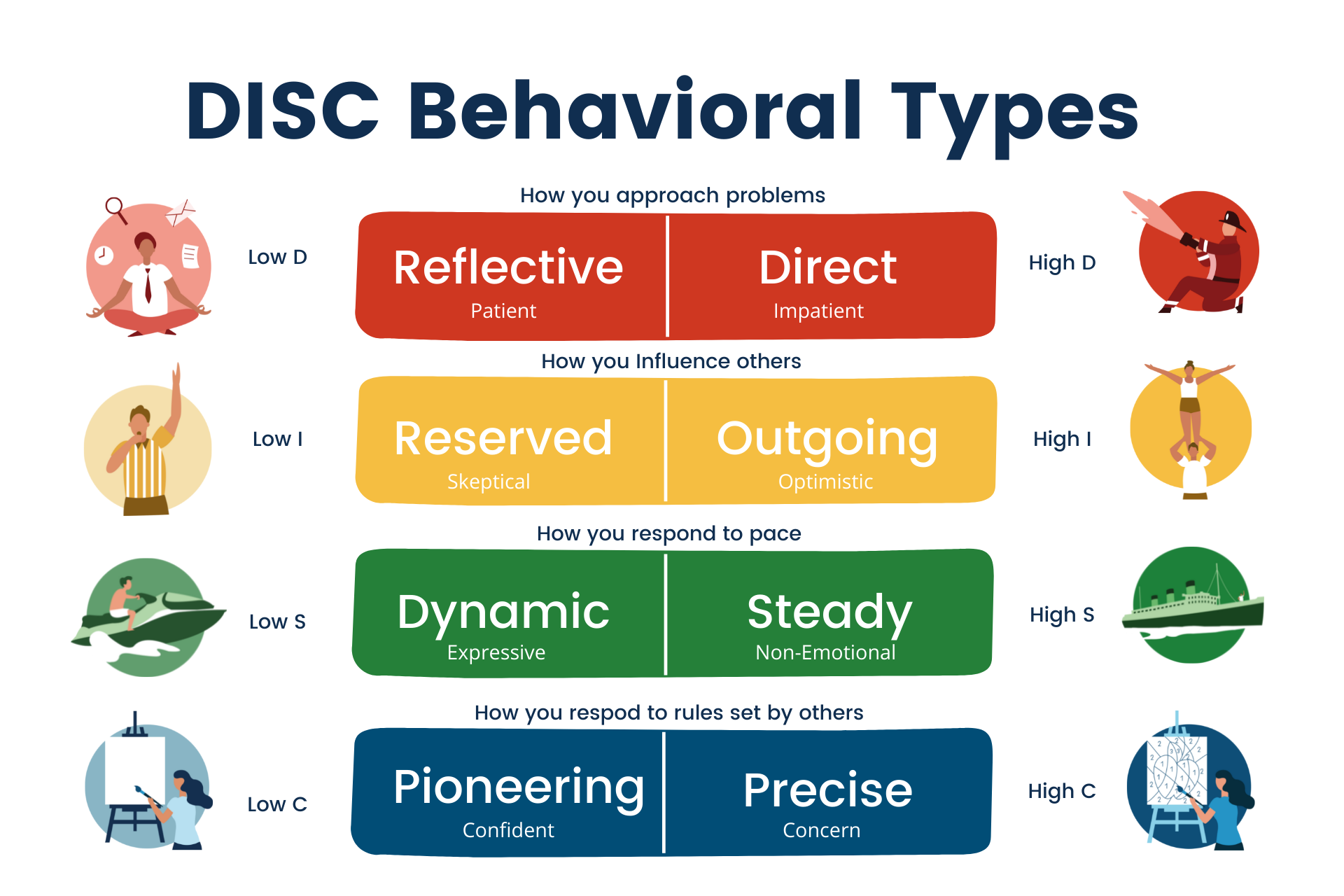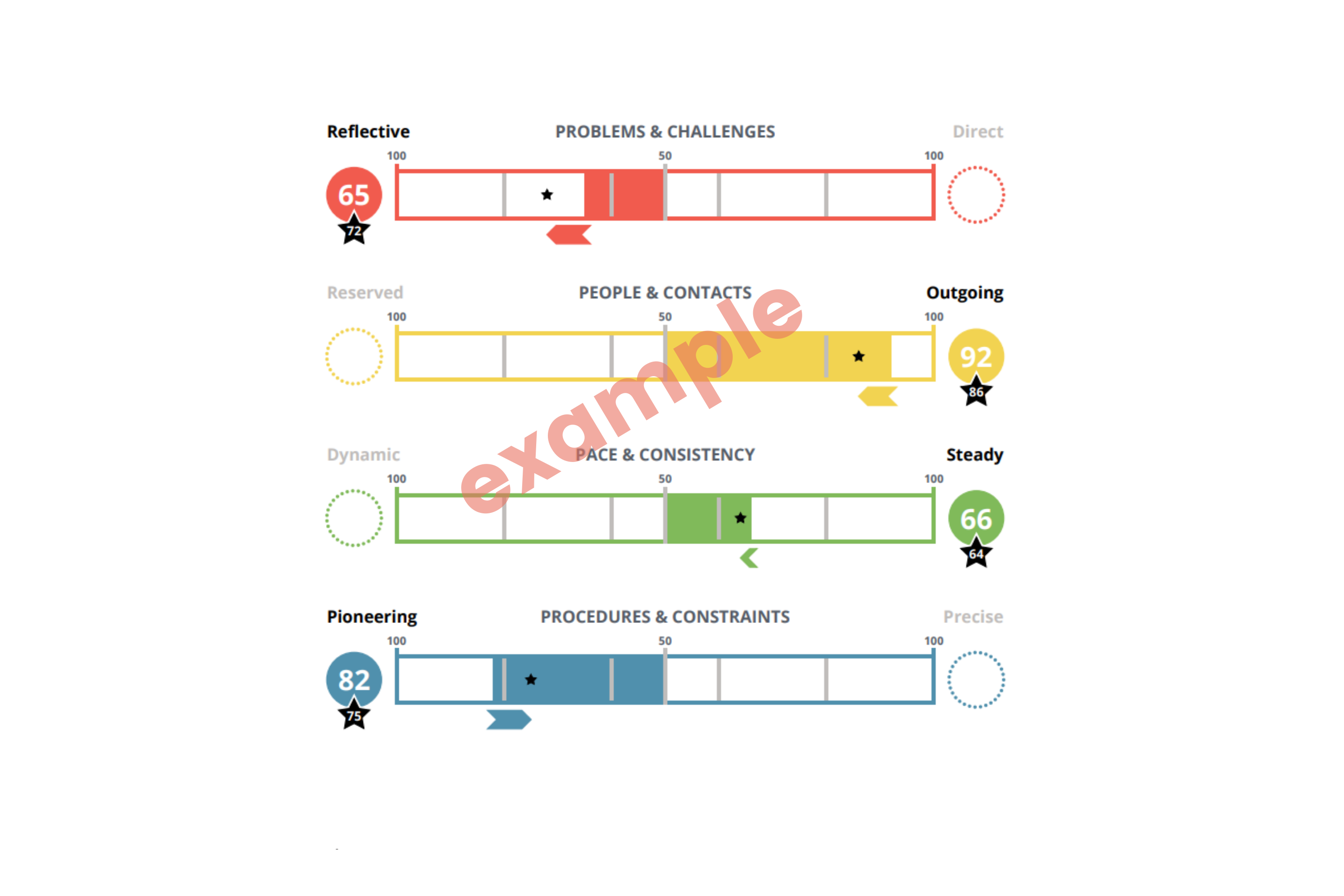Are Certain DISC Profiles Better Suited for Leadership or Management?

Some people are born leaders. They possess the soft skills that life teaches them, such as conflict management and teamwork. They connect with their staff in a myriad of ways. The question that organizations ask is, where are things breaking down? Are some personalities better suited to management positions than others? The key lies with knowledge born through scrutiny.
Undoubtedly, you’re familiar with the so-called “Great Resignation” that saw the employee turnover rate skyrocket to historic levels. According to the 2021 Gallup State of the Workplace Report, over 50 percent of workers on looking for greener pastures. The top reason employees cited for leaving their positions was a hostile or toxic work environment.
That blame rests squarely with management and a poor job fit. That’s where assessments like the DISC Leadership styles come into play.

What Is DISC?
DISC is one of many ways to gain insights into your and other people’s personalities. This understanding can empower employers and employees to read each other better. Managers can use this newfound knowledge to motivate their teams and harness their persuasion skills. Workers can realize the empathy they yearn to get at the workplace. According to Business Solver, that’s exactly what they want.
All can benefit from this self-awareness to understand others with whom they work. That is advantageous to everyone in an organization, both on and off the clock. It is the power of the DISC leadership model.
What Does DISC Stand For?

The acronym stands for the predominant trait in an individual, with D for Dominance, I for Influence, S for Steadiness, and C for Compliance. Most people are a combination of one or more types, hence, the 12 personalities. It may sound simplistic at first glance, but therein lies its usefulness. It provides a starting point from which to match the right leader with the best team for optimal performance and productivity.
Who Created the Disc Assessment? Why Is the Disc Assessment So Popular?
American psychologist William Moulton Marston developed the DISC theory as it applies to the workplace. Interestingly, Marston also was the inventor of the systolic blood pressure test and, consequently, an early model of the polygraph and the comic character Wonder Woman. The DISC assessment succeeds because of its simplicity.
Marston broke down personality types into two overall groups that are easy to understand. One is active versus passive, with the other antagonistic versus favorable. The four possible combinations are the basis for the four traits that the acronym represents. They provide a foundation for gauging the behavior of a manager and the environment present in the workplace.
Is the Disc Personality Test Accurate?
It’s essential to understand that the DISC leadership styles assessment doesn’t identify a so-called best management type. Instead, it looks more toward finding the right fit. Other psychologists have postulated similar models, such as Carl Jung and Walter Clark. It’s worth noting that Marston tested his theory in the field with over 30 million assessments and an average 81-percent self-assessed accuracy.
The figures are a testament to its validity of itself.
Its application in other arenas, such as nursing, doctoral education, and rehabilitation, provides further evidence of the DISC communication styles’ efficacy. It also illustrates its versatility and the role of personality in other endeavors. Remember that employees want to do their best. It’s good for them and allows them to take ownership of what they’re doing.
A DISC leadership assessment provides a road map for making it happen. It goes under the surface to reveal things that even the people taking the tests may not realize about themselves. It makes the statement that knowledge is power truer than ever. This test makes it possible in a non-threatening way. It also helps to safeguard against gaming the results.
What Is Personality?
To understand the value of a DISC leadership styles test, it’s essential to understand what is being accessed, namely, an individual’s personality. Merriam-Webster defines the term as “a set of distinctive traits and characteristics.” It’s fair to say that what we see isn’t always what we get. Individuals are experts at hiding what they don’t want to be known about them.
As Socrates wisely observed, “The greatest way to live with honor in this world is to be what we pretend to be.” A DISC leadership styles quiz peels back these layers to reveal the truth to avoiding those nasty surprises. It also highlights positive personality traits that an organization can use to make the best use of its resources. It’s the proverbial win-win for the employer and the employee.
What Are the Different DISC Personality Types?

The four traits making up the acronym shake out into 12 personality types. Most people have more than one of the defining characteristics. However, some may represent classic archetypes of each one. Others are a blend of other types that are equally as informative. The 12 personality types include:
- D: Take-charge leader
- DC: Independent leader focused on results
- DI: Manager using creativity for quick results
- I: Enthusiast leader
- ID: Enthusiast and bold leader
- IS: Approachable, supportive manager
- S: Diplomatic leader aiming for stability
- SC: Fair manager seeking a harmonious environment
- SI: Positive leader who puts respect first
- C: Manager centered on clear communication
- CS: Supportive leader with workplace stability at the forefront
- CD: Empowering manager striving for high standards
Each one builds on its central theme with supporting traits that you can fine-tune to fit the situation. That makes employee questionnaires a vital piece toward achieving these goals. They identify the shortcomings and needs. The DISC profile assessment provides opportunities for positive changes that optimize the use of an organization’s staff.
How Long Does It Take to Complete a DISC Personality Test?
It doesn’t take long to complete a DISC leadership styles assessment. You will likely finish it in less than a half-hour. The format makes it easy to take the test, bearing in mind that there aren’t any right or wrong answers. It’s your take on what each question is asking you. They often are one of several tools an employer may use to screen potential job candidates.
How Does a DISC Assessment Work?
The test presents a series of questions you answer on a sliding scale of strongly agree to strongly disagree. You’ll likely have an option one way or the other at first glance. It’s essential to assess the degree to which you have this opinion. That’s where the value of the test lies. First impressions are critical. However, the assessment usually includes adaptive testing.
It’s easy to recognize the different wording of a question you’ve seen before. However, the key is in the details. It’s another way to determine where you stand on either end of the spectrum. Sometimes, seeing a question in an alternative light can give you new insights. It’s also a check to determine your commitment to a particular answer.
What Motivates People in Each of the Styles?
The next step is to take the answers from a DISC management styles quiz and interpret the results. About 80 percent of Fortune 500 companies use these tools in the hiring process. No doubt, they are subjective. It’s also worth noting that science has since debunked the use of Marston’s other invention, lie detectors. However, they can help employers match the right people with the best team.
Let’s review what you can learn about DISC leadership styles and how they contribute to the various personality types.
What Motivates Different D People? I.E. Bottom Line.
Remember that D stands for dominance. These individuals are all about the bottom line. Actions and results are their goals. Not surprisingly, they are intolerant of inaction and weakness. These individuals are useful for turning things around in an antagonistic environment. They embody the traditional vision of leaders where their word goes.
DC individuals add personal accomplishment to the mix. The results aren’t just about the group but the person too. DI brings enthusiasm to the table, which can make their goals more obtainable.
What Motivates Different I People? I.E. Fun/Travel/Position.
I people are team players. They want work to be fun and, thus, motivating. Some may describe them as dreamers because they are always looking ahead. They also have magnetic personalities that employees gravitate toward because of their enthusiasm. All of these factors combine to create action and momentum in a favorable environment that they create and foster.
ID individuals keep results on the front burner while making sure things stay fun on the job. After all, motivation is the secret sauce that makes it work. IS people realize that supporting team members is imperative as the glue that holds everyone together.
What Motivates Different S People? I.E. Building Relationships, Helping People.
S people prefer stable and harmonious environments, thus, the characterization of steadiness. They are excellent at conflict resolution and encouraging diplomacy. They are assets in favorable work environments because they help maintain this status quo. They accomplish this goal by being open to employee feedback. After all, people just want to be heard and understood.
SC individuals don’t lose sight of the objectives. Building relationships is a means to the end. These leaders are well-aware of the everyday challenges that their employees face and strive to be understanding. SI leaders recognize the importance of maintaining a positive work environment as an asset.
What Motivates Different C People? I.E Values Like Excellence And Consistency.
C stands for conscientiousness which you can see in their discipline and aim for clear communication. Being emotional distracts from this goal. They prefer to lead by example and pride themselves on being correct in their assessments. They encourage compliance to tame antagonistic environments where that isn’t the case.
CS people want reliability on all fronts, whether it’s the outcomes or the support they provide their team members. Uncertainty adds stress to the workplace and home life. These individuals recognize it as poison to any social situation. CD wants results, which clarity can provide. They measure their success by this measurable standard.
What Are The Best Ways To Nudge The Different Disc Personality Types?
The chances are that learning about one’s DISC leadership traits will be a revelation for some individuals. Self-awareness is the reward of these assessments, with opportunities to use this knowledge in one’s personal life. One of the best ways to channel the results of a DISC assessment leadership styles quiz is to use behavioral nudges.
This approach uses indirect suggestions with positive reinforcement to channel one’s behavior in the desired direction. The assessment provides the direction. The nudges make it happen. The key is making them constructive, which is an underlying trait with many of the personality types. The object is to harness optimally steer them in the right direction.
For example, D people will respond to status reports that reinforce their goals toward achieving results. I people will enjoy winning the approval of their managers and team members. S people will feel victorious if they have experienced the fruits of building a positive corporate culture. Finally, C people will consider order and accuracy successes of their management style.
Final Thoughts
Understanding DISC Leadership styles can provide valuable insights for deploying your staff in ways that make the best use of their traits. Individuals have different strong points that help them succeed in work and life. These assessments help employers and employees realize where their strengths lie. It’s empowering for anyone to know which direction they should swim to be the best person they can be.
Striving for self-awareness isn’t an easy endeavor. It’s often painful to come to grips with one’s shortcomings. However, the silver lining is that these assessments provide an honest appraisal without judgment. It helps people take stock of who they are and make the best of their assets. Visit Kutsko Consulting today for your free sample test.

Free Preview
Sign up now and get access to our Free Preview as well as the freshest tips and tricks delivered to your inbox once a week. Our weekly newsletter is trusted by thousands of managers, executive leaders, and learning & development professionals.
We hate SPAM. We will never sell your information, for any reason.
